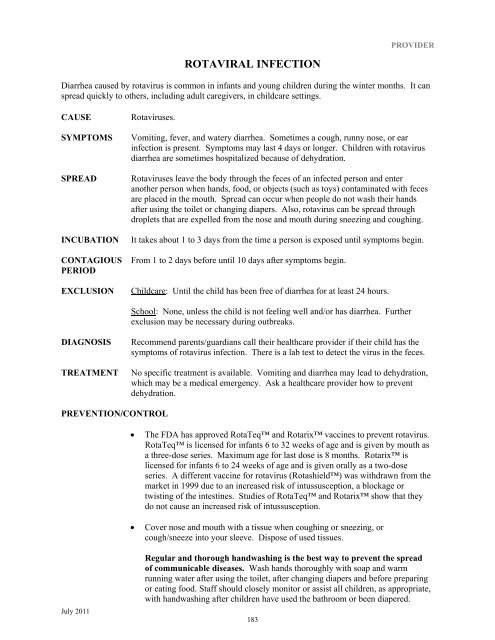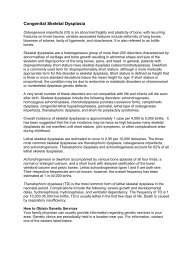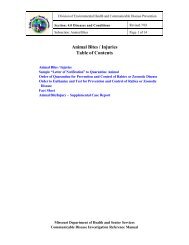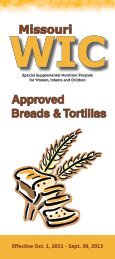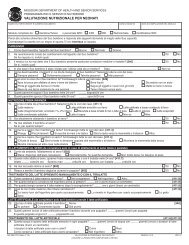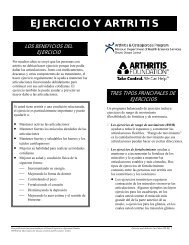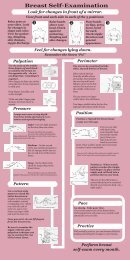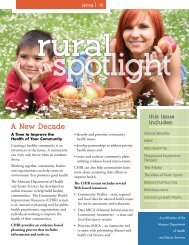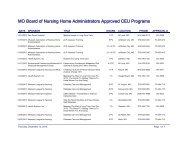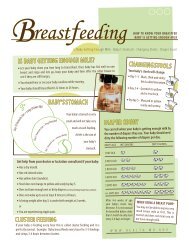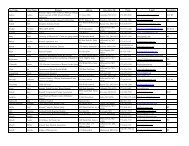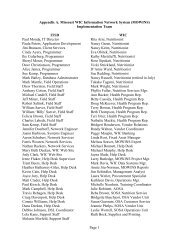Prevention and Control of Communicable Diseases - Missouri ...
Prevention and Control of Communicable Diseases - Missouri ...
Prevention and Control of Communicable Diseases - Missouri ...
You also want an ePaper? Increase the reach of your titles
YUMPU automatically turns print PDFs into web optimized ePapers that Google loves.
July 2011<br />
ROTAVIRAL INFECTION<br />
183<br />
PROVIDER<br />
Diarrhea caused by rotavirus is common in infants <strong>and</strong> young children during the winter months. It can<br />
spread quickly to others, including adult caregivers, in childcare settings.<br />
CAUSE Rotaviruses.<br />
SYMPTOMS Vomiting, fever, <strong>and</strong> watery diarrhea. Sometimes a cough, runny nose, or ear<br />
infection is present. Symptoms may last 4 days or longer. Children with rotavirus<br />
diarrhea are sometimes hospitalized because <strong>of</strong> dehydration.<br />
SPREAD Rotaviruses leave the body through the feces <strong>of</strong> an infected person <strong>and</strong> enter<br />
another person when h<strong>and</strong>s, food, or objects (such as toys) contaminated with feces<br />
are placed in the mouth. Spread can occur when people do not wash their h<strong>and</strong>s<br />
after using the toilet or changing diapers. Also, rotavirus can be spread through<br />
droplets that are expelled from the nose <strong>and</strong> mouth during sneezing <strong>and</strong> coughing.<br />
INCUBATION It takes about 1 to 3 days from the time a person is exposed until symptoms begin.<br />
CONTAGIOUS<br />
PERIOD<br />
From 1 to 2 days before until 10 days after symptoms begin.<br />
EXCLUSION Childcare: Until the child has been free <strong>of</strong> diarrhea for at least 24 hours.<br />
School: None, unless the child is not feeling well <strong>and</strong>/or has diarrhea. Further<br />
exclusion may be necessary during outbreaks.<br />
DIAGNOSIS Recommend parents/guardians call their healthcare provider if their child has the<br />
symptoms <strong>of</strong> rotavirus infection. There is a lab test to detect the virus in the feces.<br />
TREATMENT No specific treatment is available. Vomiting <strong>and</strong> diarrhea may lead to dehydration,<br />
which may be a medical emergency. Ask a healthcare provider how to prevent<br />
dehydration.<br />
PREVENTION/CONTROL<br />
� The FDA has approved RotaTeq <strong>and</strong> Rotarix vaccines to prevent rotavirus.<br />
RotaTeq is licensed for infants 6 to 32 weeks <strong>of</strong> age <strong>and</strong> is given by mouth as<br />
a three-dose series. Maximum age for last dose is 8 months. Rotarix is<br />
licensed for infants 6 to 24 weeks <strong>of</strong> age <strong>and</strong> is given orally as a two-dose<br />
series. A different vaccine for rotavirus (Rotashield) was withdrawn from the<br />
market in 1999 due to an increased risk <strong>of</strong> intussusception, a blockage or<br />
twisting <strong>of</strong> the intestines. Studies <strong>of</strong> RotaTeq <strong>and</strong> Rotarix show that they<br />
do not cause an increased risk <strong>of</strong> intussusception.<br />
� Cover nose <strong>and</strong> mouth with a tissue when coughing or sneezing, or<br />
cough/sneeze into your sleeve. Dispose <strong>of</strong> used tissues.<br />
Regular <strong>and</strong> thorough h<strong>and</strong>washing is the best way to prevent the spread<br />
<strong>of</strong> communicable diseases. Wash h<strong>and</strong>s thoroughly with soap <strong>and</strong> warm<br />
running water after using the toilet, after changing diapers <strong>and</strong> before preparing<br />
or eating food. Staff should closely monitor or assist all children, as appropriate,<br />
with h<strong>and</strong>washing after children have used the bathroom or been diapered.


